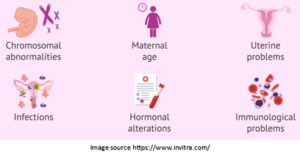Miscarriage is the loss of a pregnancy before the 20th week. It is a distressing experience for many couples and can occur for various reasons. Miscarriages can happen at any stage of pregnancy, including at 6 weeks.
Miscarriage at 6 weeks can be a devastating experience for couples trying to conceive, raising questions about their fertility journey. In such cases, seeking the guidance of an experienced IVF specialist becomes crucial.
Nisha IVF Centre in Ahmedabad, led by Dr. Nisarg Patel, provides support and guidance to patients experiencing such losses.
Dr. Nisarg Patel, an esteemed IVF specialist in Ahmedabad, is renowned for his expertise in assisting couples facing fertility challenges. He can provide compassionate care and guidance on physical and emotional recovery and help individuals and couples explore future options for achieving a successful pregnancy.
Signs of miscarriage at 6 weeks are characterized such as vaginal bleeding, abdominal cramps, and the passing of tissue. While the pain of a miscarriage can be overwhelming, it is essential to know that various treatment options, including IVF, are available to increase the chances of a successful pregnancy.
However, one should decide to opt for IVF after carefully considering individual circumstances and consulting a qualified fertility specialist.
Does Miscarriage Happen At 6 Weeks Of Pregnancy?
 The chance of miscarriage at 6 weeks are relatively high, with some estimates suggesting a risk of around 10-20%.
The chance of miscarriage at 6 weeks are relatively high, with some estimates suggesting a risk of around 10-20%.- Factors that may increase the risk include maternal age, certain medical conditions, lifestyle choices, and previous miscarriages.
- Miscarriages at 6 weeks can be emotionally painful for women and their partners, and proper aftercare is crucial. Dr Nisarg Patel can provide guidance on post-miscarriage care, including physical recovery and emotional support.
- For women who experience recurrent miscarriages at 6 weeks or multiple miscarriages, further investigation may be necessary to identify any underlying causes.
- Dr. Nisarg Patel and his team at Nisha IVF Centre can conduct thorough evaluations to assess potential factors contributing to recurrent miscarriages and provide appropriate treatment options.
What Can Be The Impact Of Miscarriage At 6 Weeks?
- Miscarriage at 6 weeks can profoundly impact individuals and couples emotionally, physically, and mentally. The loss of a pregnancy at such an early stage can be devastating and may lead to feelings of grief, sadness, and a sense of loss.
- The emotional impact can vary from person to person. Recovery after a miscarriage may also take time as the body adjusts and heals.
- In addition to the emotional and physical impact, a miscarriage at 6 weeks can also have implications for future pregnancies.
- It is essential for individuals who have experienced a painful miscarriage to seek medical guidance and support to understand the potential underlying causes and to address any concerns or risks associated with subsequent pregnancies.
How To Avoid Miscarriage At 6 Weeks?
 To increase the chances of preventing a miscarriage at 6 weeks, it is essential to seek proper medical care and follow certain precautions.
To increase the chances of preventing a miscarriage at 6 weeks, it is essential to seek proper medical care and follow certain precautions.
- In case of a miscarriage, immediate medical attention should be sought to discuss appropriate treatment options and receive necessary care.
- It is important to note that while the risk of miscarriage at 6 weeks exists, each individual’s circumstances and chances of a successful pregnancy can vary. After miscarriage care is crucial to physical and emotional healing.
Can This Lead To Recurrent Miscarriage?
 While experiencing a miscarriage at 6 weeks does not necessarily indicate a higher risk of recurrent miscarriage.
While experiencing a miscarriage at 6 weeks does not necessarily indicate a higher risk of recurrent miscarriage.
- Recurrent miscarriage in 1st trimester is three or more consecutive pregnancy losses before 20 weeks of gestation.
- Recurrent miscarriage at 6 weeks is relatively rare and affects about 1-2% of couples trying to conceive. It is typically attributed to various factors, including genetic abnormalities, hormonal imbalances, structural abnormalities of the uterus, autoimmune disorders, blood clotting disorders, and certain infections.
- Having one miscarriage does not necessarily mean that a person will experience recurrent miscarriages in the future.
- However, if a person has had multiple miscarriages, including one at 6 weeks, it is essential to consult a healthcare professional for further evaluation and investigation.
- They can conduct tests to identify underlying causes that may increase the risk of recurrent miscarriage and develop a personalized management plan.
How To Cope-Up With Miscarriage At 6 Weeks?
 Coping with a miscarriage at 6 weeks can be emotionally challenging. Here are some brief suggestions to help cope:
Coping with a miscarriage at 6 weeks can be emotionally challenging. Here are some brief suggestions to help cope:
1. Allow yourself to grieve: Acknowledge your feelings of loss and permit yourself to grieve. It is normal to feel a range of emotions, such as sadness, anger, and confusion.
2. Seek support: Reach out to your partner, family, or close friends for emotional support. Consider joining a support group or seeking professional counselling to help you process your emotions.
3. Take care of yourself: Focus on self-care activities promoting physical and emotional well-being. Get enough rest, eat nutritious meals, exercise gently, and engage in activities that bring you comfort and relaxation.
4. Express your emotions: Find healthy outlets to express your feelings, such as writing in a journal, creating art, or talking to a trusted confidant. This can help you process your emotions and find healing.
5. Give yourself time: Healing takes time, and everyone’s journey differs. Be patient with yourself and allow yourself to heal at your own pace. It is okay to have good and bad days.
6. Communicate with your healthcare provider: Talk to your healthcare provider about your emotions and any physical concerns. They can provide guidance, answer your questions, and offer resources for additional support.
Is There A Need For IVF After Miscarriage At 6 Weeks?
Generally, a miscarriage at 6 weeks does not necessarily indicate a need for in vitro fertilization (IVF) as a subsequent treatment. IVF is typically recommended for individuals or couples experiencing infertility or having difficulty conceiving naturally.
However, if a person has experienced multiple miscarriages or has known fertility issues, they may seek medical advice from a fertility specialist. They can evaluate the individual’s situation, conduct thorough testing, and recommend fertility treatments, including IVF, if necessary.
After experiencing a miscarriage at 6 weeks, the need for IVF depends on various factors and individual circumstances. In general, a miscarriage at such an early stage is often attributed to chromosomal abnormalities or other genetic factors rather than issues with fertility or conception.
Most women who experience a miscarriage at 6 weeks can conceive naturally again and have successful pregnancies without needing IVF.
However, there may be situations where IVF is recommended following a miscarriage. If there are underlying fertility issues or a history of recurrent miscarriages, IVF may be considered as a potential option.
IVF can help address specific fertility concerns and increase the chances of a successful pregnancy.
How To Prepare Yourself For IVF Journey?
Preparing for an in vitro fertilization (IVF) journey can be exciting and overwhelming. Here are a few essential steps to help you prepare for this transformative experience:

- Firstly, it is crucial to educate yourself about the IVF process. Understand the various stages, procedures, and potential challenges associated with IVF.
- Familiarize yourself with the medications, tests, and appointments part of your journey. Consult with your fertility specialist and ask any questions you may have to clarify your doubts and concerns.
- Secondly, focus on your overall health and well-being. Prioritize a healthy lifestyle by adopting a balanced diet, exercising regularly, and maintaining a healthy weight. Quit smoking, limit alcohol consumption, and avoid excessive stress. It is also advisable to start taking prenatal vitamins and supplements your doctor recommends.
- Lastly, establish a strong support system. IVF can be emotionally taxing, so it is essential to have people around you who understand and support you. Share your plans and concerns with your partner, family, and close friends.
Consider joining support groups or online communities to connect with others going through a similar journey. Seeking the guidance of a therapist or counsellor experienced in fertility issues can also provide valuable emotional support.
Remember, preparing for an IVF journey involves physical and emotional readiness. By gaining knowledge, taking care of your health, and seeking support, you can better navigate the IVF process and increase your chances of a successful outcome.
Frequently Asked Questions
1. Should I go to the hospital for a 6-week miscarriage?
A. It depends on the individual circumstances. Sometimes, a 6-week miscarriage can be managed at home with medical guidance. However, if you experience severe pain, heavy bleeding, or other concerning symptoms, it is advisable to consult with your healthcare provider.
2. Can an ultrasound detect a miscarriage at 6 weeks?
A. Yes, an ultrasound can typically detect a miscarriage at 6 weeks. It can reveal the absence of a gestational sac or fetal heartbeat, indicating a non-viable pregnancy. However, in some cases, a follow-up ultrasound may be necessary to confirm the diagnosis.
3. What does a 6-week fetus look like?
A. At 6 weeks, a fetus is still in the early stages of development. It is about the size of a lentil or pea and may have a visible fetal pole and a heartbeat. The fetus primarily comprises developing structures, including the neural tube, which will later become the brain and spinal cord.
4. What tests are done after a miscarriage?
A. After a miscarriage, healthcare providers may perform specific tests to determine the cause and provide appropriate guidance. These tests may include a physical examination, blood tests to check hormone levels, genetic testing on the pregnancy tissue (if available), and imaging studies such as an ultrasound to ensure complete miscarriage or to evaluate the uterus for abnormalities.


